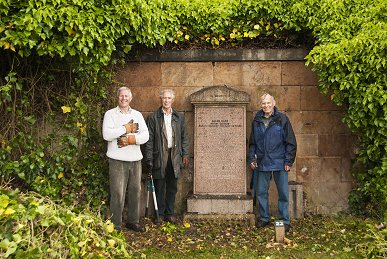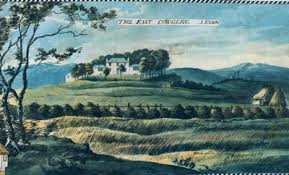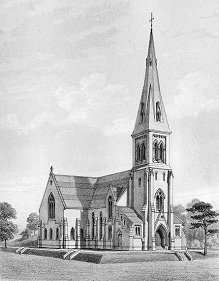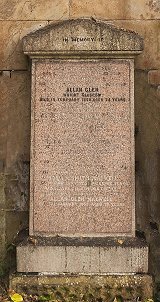Allan Glen
Allan Glen was born in 1772 and brought up on the family farm in Pollokshaws where he saw at first hand the poverty of the spinners and weavers of that district.
Pollokshaws was then a small country town with a population of around 2,000, mostly employed in the cotton industry. The working day was twelve hours (but only nine on Saturday), and pay seldom exceeded 12s a week for men and 6s for women. Local records indicate that of 711 children attending the parish school in 1796, only 105 attended school. Pupils paid for classes according to the subject - maths at 5s a quarter had two scholars, whereas Latin at 4s had 22. English was the cheapest, at 2s.
Allan Glen is thought to have come to Glasgow around 1800 and in 1810 he set up as a master wright. The Wrights of Glasgow were granted a charter in 1600 and became a distinct trade incorporation, with a monopoly on the craft. It also required all its members to be burgesses of the city, and as an incomer, Allan Glen had to buy his burgess ticket. Following an examination to prove his skills, he was admitted to the Guild on May 8th, 1810, for the fee of £17 0s 10d.
In the same year a congregation of the Unitarian Church was formed in Glasgow, and Allan Glen's name is on the first list of members. He remained a member for forty years and left a bequest of £50 to the church.
He was a successful tradesman and businessman, for most of his life living in what we would now regard as the city centre - John Street, Frederick Street and High John Street. He invested chiefly in property, and in 1814, in partnership with two others, he purchased grounds and tenements in Dempster Street and North Hanover Street, adding to his purchases in the area in 1823. It was on this site that his school would be erected. At his death he owned property in High St, Clyde St, Dempster St, Duncan St, Hanover St, John St, Saltmarket St and Grahamston in Barrhead.
Allan Glen died at Gourock on 18th February 1850, and was buried at the Southern Necropolis in Glasgow. The register of interments states that he was seventy-eight years of age and died of paralysis. His grave lies at the east wall of the cemetery.
 School Club members clearing Allan Glen's grave at the Southern Necropolis.
School Club members clearing Allan Glen's grave at the Southern Necropolis.
About Allan Glen
Until recently the introduction above was the only information known about Allan Glen. We are therefore grateful to former pupil John McGee who has undertaken extensive genealogical research and was able to put together a fuller picture of Allan Glen and his life. This is summarised below, and you can download his full report here.
Parentage
 There is some confusion over Allan Glen’s exact parentage, caused by the 1841 census where Allan Glen states his approximate age as 60, which would suggest that he was born sometime before 1781. However, on Allan Glen’s gravestone at the Southern Necropolis, Govan his age was given as 78 when he died on 18 February 1850, which would mean that he was born in 1772. Further records, although uncorroborated by documentary evidence as yet, state that he was born in 1772 as the son of George Glen a tenant farmer at Cowglen in Pollokshaws, Eastwood Parish, Renfrewshire. What is further known is that, although Allan Glen became a member of the Unitarian Church, he left a bequest to Eastwood Parish Church, suggesting a strong link to this church, which lies about a mile west of Cowglen Farm.
There is some confusion over Allan Glen’s exact parentage, caused by the 1841 census where Allan Glen states his approximate age as 60, which would suggest that he was born sometime before 1781. However, on Allan Glen’s gravestone at the Southern Necropolis, Govan his age was given as 78 when he died on 18 February 1850, which would mean that he was born in 1772. Further records, although uncorroborated by documentary evidence as yet, state that he was born in 1772 as the son of George Glen a tenant farmer at Cowglen in Pollokshaws, Eastwood Parish, Renfrewshire. What is further known is that, although Allan Glen became a member of the Unitarian Church, he left a bequest to Eastwood Parish Church, suggesting a strong link to this church, which lies about a mile west of Cowglen Farm.
Although not fully confirmed at this stage, it is almost certain that Allan Glen is descended from Option b), however, given the naming conventions it is likely that Allan Glen, farmer at Wester Shiells in Govan, is related to George Glen, farmer at Cowglen in Eastwood, although this has not been confirmed.
Option a) Allan Glen (1779 – 1850)
The first possible Allan Glen was born on 21 March 1779 in the parish of Govan, Renfrewshire to father Allan Glen, farmer at Wester Shiells, and mother Agnes Bryson, the only known son of five known children. The parish of Govan at that time was autonomous and outside of the boundaries of the city of Glasgow and Allan Glen, who spent most of his working life in Glasgow, Lanarkshire, later confirmed that he was born outside of the county, which accords with him being born in Renfrewshire.
Option b) Allan Glen (1772 – 1850)
The second more likely Allan Glen was born on 30 December 1772 in the parish of Abbey, Paisley, Renfrewshire to father George Glen, farmer at Cowglen, and mother Marion Mitchell, and the oldest son of four known children. Again this accords with Allan Glen’s later assertion that he was born outside of the county of Lanarkshire, which still accords with him being born in Renfrewshire. In fact, parish records going back to the 17th century seem to accord that the name Allan Glen is predominantly associated with the county of Renfrew.
Lineage
Father - George Glen (1736 – >1779)
George Glen was most likely born on 30 May 1736 at the Old Paper Mill, Cathcart, Renfrewshire to father Allan Glen and mother Jean Paterson, although this has not been fully confirmed.
 By about 1740 the family had moved to the Abbey parish of Paisley, Renfrewshire. George Glen, a farmer at Cowglen, Pollokshaws, Eastwood married wife Marion Mitchell at Eastwood Parish Church on 5 November 1771.
By about 1740 the family had moved to the Abbey parish of Paisley, Renfrewshire. George Glen, a farmer at Cowglen, Pollokshaws, Eastwood married wife Marion Mitchell at Eastwood Parish Church on 5 November 1771.
George and Marion had 4 known children born at Cowglen and baptised in the Abbey parish, Paisley; Allan (b. 30 December 1772), Robert (b. 3 September 1774), Jean (b. 3 June 1777) and John (b. 23 November 1779).
The births help to corroborate that George Glen and Marion Mitchell are the parents of Allan Glen, the wright and philanthropist in Glasgow. The date of Allan Glen’s birth in 1772 accords with his age as recorded on his gravestone in 1850 at the Southern Necropolis. Also, the fact that George Glen named his first son Allan is in line with the traditional Protestant Scottish Naming Convention after his paternal grandfather, thus Allan Glen and his first named daughter was Jean after her paternal grandmother, thus Jean Paterson. Allan Glen, the wright, was also known to have lived with his sister Jean Smith nee Glen.
The fourth child is interesting in that the original entry was Christian, a daughter, but then changed to John, a son. It is not known whether George and Marion had been expecting a daughter Christian but then they discovered the child was a boy named John. Possibly, there could have been twins, where the girl died. What is important here is that Allan Glen had a cousin named Christian Mitchell and the suggestion from the baptism is that Christian is a name from his maternal lineage through his mother Marion Mitchell, which provides some further corroboration.
Grandfather - Allan Glen (1704 – >1754)
Allan Glen was almost certainly born on 28 December 1704 in Cowglen, Pollokshaws, Eastwood to father George Glen, a farmer in Cowglen, and mother Agnes Craig. He was baptised on 7 January 1705 in Eastwood Parish Church by the Rev Robert Woodrow.
Allan Glen married wife Jean Paterson on 2 May 1735 in Cathcart, Renfrewshire and they had 8 known children in Renfrewshire; George (b. 30 May 1736, Cathcart), Adam (b. 29 October 1738, Newlands), Jean (b. 24 August 1740, Abbey), Agnes (b. April 1743, Lochdam), Janet (b. 9 August 1746, Abbey), Thomas (b. 20 January 1749, Abbey, likely to have died in infancy), Thomas (b. 19 September 1751, Abbey) and Mary (b. 5 May 1754, Abbey).
Again, according to the strict Protestant Scottish Naming Convention Allan Glen has named his son after the paternal grandfather, thus George Glen, although, it would have been expected to see the first daughter named Agnes, which appears not to be the case. However, the second born daughter has been named Agnes after her paternal grandmother named Agnes Craig.
Great-Grandfather - George Glen (~1660 – > 1729)
George Glen was born around 1660 most likely in Cowglen, Pollokshaws, Eastwood. George Glen in Eastwood married wife Agnes Craig in East Kilbride on 2 September 1698 in Kirkton, East Kilbride. George and Agnes had 8 known children in Cowglen; Thomas (b. 16 August 1699), Janet (b. 2 August 1700), Agnes (b. 28 October 1702), Allan (b. 28 December 1704), Jean (b. 26 May 1707), Mary (b. 2 July 1709) and John (b. 8 April 1712).
Work and business
After any schooling that Allan Glen may have had, he embarked on a trade as a joiner, with some unconfirmed records stating that he was apprenticed to a carpenter in the village of Pollokshaws, which is in close proximity to Cowglen Farm. Then he later moved to be a wright in Glasgow, believed to be around 1810. He joined the Incorporation of Glasgow Wrights on 18 May 1840 by purchase as a guild brother and burgess. On 15 June 1840 he was admitted as an operative stranger to the Incorporation. The fact that Allan Glen had to buy his ‘burgess ticket’ also suggests that he had moved into Glasgow from outside the city and that neither his father nor father-in-law were guild members.
It appears that Allan Glen never married nor had any known offspring and instead he set out to become a self-made business man of some considerable success. He expanded his joinery business and also invested in land and properties mainly within the city of Glasgow. It is not known exactly when Allan Glen moved from Pollokshaws to become resident in Glasgow, although probably around about 1810. In 1811 and 1812 there are trades listings for a Glen & Thomson, joiners, at Union Place, Glasgow; however, it is unclear whether this firm indeed included Allan Glen. He is certainly well recorded in the Trades Directories of Glasgow from 1814 until 1847.
Between 1814 and 1817 Allan Glen, a joiner, operated from premises at 48 John Street, Glasgow. The site is now appropriately close to the University of Strathclyde. Then from 1818 until 1825 Allan Glen, a joiner, had premises at nearby 14 North Frederick Street, Glasgow. This was likely to have been close to George Square near the foot of North Frederick Street. He then moved up the hill and from 1826 until 1835 he was listed as Allan Glen, joiner, 63 North Frederick Street, Glasgow; then from 1836 until 1846 he was listed as Allan Glen, wright, at the same address. Finally, from 1847 until 1849 he moved two doors further up to finish as Allan Glen, wright, at 67 North Frederick Street, Glasgow. This was the last entry in the Trades Directories, but it suggests that Allan Glen worked as a wright right up until his death the following year.
Allan Glen’s working life was closely associated with John Smith and it may have been this association that eventually brought him into Glasgow to conduct his business. Glasgow was beginning to flourish and expand into the 19th century and Glen’s business acumen may have sensed this and capitalised on the opportunities for expansion.
Family
It appears that Allan Glen never married nor had any known offspring and instead he set out to become a self-made business man of some considerable success.
His niece Marion Smith was married to William Maxwell, a wright at Holm Street, Anderston, Glasgow by Rev Michael Willis, minister of the Burgher Chapel, Renfield Street, Glasgow in the Barony parish. It would appear that the marriage was one of necessity as Marion Smith had given birth to her son Allan three weeks prior to the wedding. Allan Glen stood as the witness at the birth of his great-nephew named in his honour. Allan Glen Maxwell was born on 19 June 1832 in Glasgow to father William Maxwell, a joiner, probably employed by Allan Glen, and mother Marion Smith, daughter of Glen’s sister Jean Smith nee Glen. There was some suggestion that the Glen family of Cowglen was related in some way to the Maxwells of Pollok, who owned the Pollok Estate including Cowglen. This has not been proven, but it may have been a misconception based on this Maxwell family relationship.
By 1841 Allan Glen was living at the home of his brother-in-law John Smith and his sister Jean Smith nee Glen. Allan Glen, given as 60, a joiner, resided at Little Hamilton Street, Glasgow with his brother-in-law John Smith, 70, a sawyer journeyman, his sister Jean, 65, his nephew Allan Smith, 20, a sawyer journeyman, his niece Margaret Smith, 30, and a great-niece Jean Wilson, 3. Little Hamilton Street was later renamed as Martha Street, most famously associated with the Registry Office for Glasgow. It is likely that Glen’s joinery business would have worked closely with the Smith’s sawing business. In fact, it appears that William Maxwell and John Smith were in business together as Allan Glen made mention of Maxwell & Smith being creditors in his Inventory of 1850.
Glen’s niece Margaret Smith was named in his Will as being married to Andrew Wilson, a soldier with the Regiment, probably the Glasgow Regiment. It would seem likely that Jean Wilson, aged 3, would have been Andrew Wilson and Margaret Smith’s daughter and that possibly Wilson was away on active service at the time of the census or possibly deceased as Andrew Wilson was certainly recorded as deceased by 1850 in Allan Glen’s Will.
Death
By 1847 Allan Glen decided to set down the terms of his Will, which importantly left a lasting legacy leading to the building of the first Allan Glen’s School at the top of North Hanover Street and Cathedral Street on a piece of Glen’s own land in 1851. In the winter of 1850 Allan Glen, stated by one of his executors as being in ill health, moved down to the fresher air of Gourock seeking some rest and recuperation. His lawyer Mr A Jameson recorded on 28 March 1850 that “the deceased Allan Glen Wright in Glasgow [….] died at Gourock where he was temporarily residing upon the 18th day of February last”. Allan Glen, 78, died in Gourock of paralysis and his body was returned to Glasgow where he was buried at the Southern Necropolis, Govan, Renfrewshire.
 The following is transcribed in the Monumental Inscriptions for the Southern Necropolis:-
The following is transcribed in the Monumental Inscriptions for the Southern Necropolis:-12. In memory of Marion Smith Maxwell died 6th January 1847 aged 43 years/ William Maxwell died 20th December 1848 aged 43 years/ Allan Glen, Wright, Glasgow, died 18th February 1850 aged 78 years/ Margaret Bain died 3rd June 1873 aged 77 years/ Archibald Cunningham Maxwell died 19th November 1874 aged 2 years 9 months/ William Maxwell, Wright, Glasgow died 31st October 1881 aged 41 years/ Dan Cunningham Maxwell died 3rd April 1884 aged 8½ months/ Allan Glen Maxwell, Wright, Glasgow died 24th January 1902 aged 29 years/ Marion Smith Maxwell died 19th February 1931 aged 60 years/ Margaret Bain Maxwell died 19th May 1938 aged 63 years/ Allan Glen Maxwell died 21st January 1953 aged 75 years.
end faq
The Bequest
On 2nd March, 1850 the Glasgow Examiner and later the Glasgow Herald reported that
"We understand that Mr Allan Glen, a citizen of Glasgow for half a century, who died last week, has left the greater part of his fortune amounting to nearly £20,000 for the endowment of two schools in Glasgow. We have not heard the full particulars of the bequest, but we understand the schools are to be free of sectarian trammels"
The first of these schools would become Allan Glen's School, and the residue of his estate was to be used to build and endow an industrial school for destitute children. Subsequent Education Acts expanded the education base and reduced the need for the second school, which was never built.
The Endowment Trust
In the 1990s, during local government reorganisation, a sum of money was found which was thought to be the remnants of Allan Glen's legacy. The club was contacted about this, and following discussions the Allan Glen's Endowment Trust was set up.